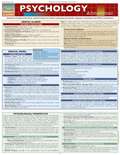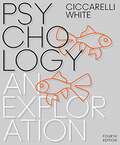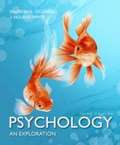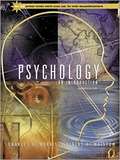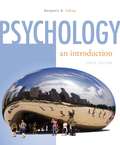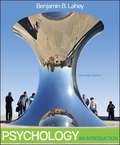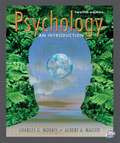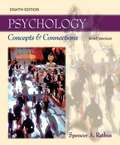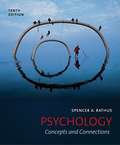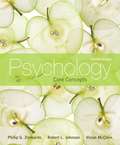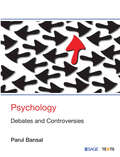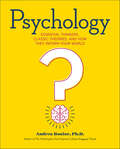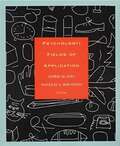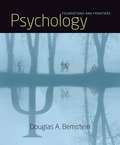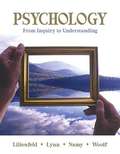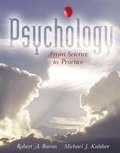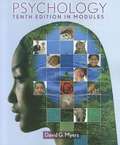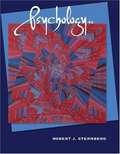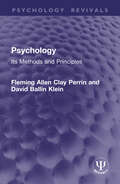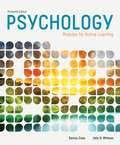- Table View
- List View
Psychology: AP Version (Seventh Edition)
by Jared BernsteinSeventh edition has an increased amount of material on applied psychology without losing the book's emphasis on basic research in psychology. Also contains substantial material on culture and human diversity.
Psychology: Abnormal
by Albert E. LyngzeidetsonPsychology students and those already practicing in the field will want to obtain this jam-packed, 3-panel (6 page) expanded version of BarCharts popular Psychology: Abnormal guide. The new information, along with the original guide text, lists a variety of mental disorders and the therapies used to treat them; each color-coded section features key definitions and examples for easy reference.
Psychology: An Exploration
by Saundra Ciccarelli J. WhiteFor courses in Introductory Psychology. <p><p>The most learner-centered and assessment-driven brief text available. <p><p>Throughout Psychology: An Exploration , 4th Edition, Saundra Ciccarelli and J. Noland White employ a learner-centered, assessment-driven approach that maximizes student engagement, and helps educators keep students on track. In this brief text, the authors draw students into the discipline by showing how psychology relates to their own lives. Clear learning objectives, based on the recommended APA undergraduate learning outcomes, guide students through the material. And assessment tied to these learning objectives lets students check their understanding, while allowing instructors to monitor class progress and intervene when necessary to bolster student performance.
Psychology: An Exploration (3rd Edition)
by Saundra K. Ciccarelli J. Noland WhiteNow in its third edition, Psychology: An Exploration draws students into the discipline by showing how psychology relates to their own lives. Clear learning objectives, based on the recommended APA undergraduate learning outcomes, guide students through the material. And assessment tied to these learning objectives lets students check their understanding, while allowing instructors to monitor student progress and intervene when necessary to bolster student performance.
Psychology: An Introduction
by Charles G. Morris Albert A. MaistoThis best-selling book on introductory psychology is headlined by the contributions of co-author Al Maisto, the Carnegie Foundation's College Professor of the Year. The close collaboration of master author Charles G. Morris with Al Maisto keeps Psychology: An Introduction at the cutting edge of the discipline through the use of relevant material and recent examples. Classic studies are carefully integrated with the most up-to-date research to provide readers with an accurate and current view of the field. <P><P>The book presents introductory psychology as a science and as a diverse discipline, with a focus on critical thought and analysis of ideas—and a keen eye on how new technology can enhance the teaching and learning experience. Chapter topics include the biological basis of behavior, sensation and perception, consciousness, learning, memory, cognition and language, intelligence and mental abilities, motivation and emotion, life span development, personality, stress and health psychology, psychological disorders, therapies, and social psychology. For individuals looking for a thorough and appealing introduction to psychology.
Psychology: An Introduction (10th edition)
by Benjamin B. LaheyThis introductory undergraduate psychology text covers central concepts in a reader-friendly writing style and a highly visual format, with color photos, illustrations, cartoons, medical images, and multiple-page visual reviews of brain structures, the sense organs, stage theories of development, and theories of motivation, emotion, and personality. Pedagogical features include chapter outlines and prologues, nested review and summary features, and close attention to visual cues such as typeface, size, and color, as well as clear verbal cues to alert readers to new information. An introductory chapter describes study skills, defines critical thinking, and gives advice especially for first-generation college students. Coverage progresses from foundations through awareness, learning and cognition, developmental psychology, the self, health and adjustment, and social context. This tenth edition offers streamlined content and a slightly shorter book, with a new chapter on the interplay of nature and nurture. Information on diversity and culture, sex differences, gender roles, and sexuality is integrated throughout the text. Lahey is affiliated with the University of Chicago.
Psychology: An Introduction (11th Edition)
by Benjamin B. LaheyWith this textbook, Lahey (U. of Chicago) aims to acquaint students with the science of psychology in a clear way and emphasize meaningful learning and remembering. This edition incorporates new information on biological foundations of behavior and the interplay of nature and nurture; discussion of videogames and visual perception, complementary colors, kinesthetic receptors, phantom pain, and pheromones and sexual attraction; more on states of consciousness, including multitasking, selective attention, mindless reading, and shift work; and discussion of memory, deep processing, and sleep. It also addresses creative problem solving; breastfeeding and children's intelligence; new topics in developmental psychology, including adjustment to cochlear implants, the importance of the prenatal environment, individual variation, and the impact of grandparents, day care, and divorce; motivation and emotion; personality and future academic success, physical health, and longevity; stress, depression, and health, including the link between excessive alcohol use, academic failure, and injuries and death; definitions and cultural and scientific influences related to abnormal behavior; and new research and coverage of social networking, individual brainstorming, conformity, and discrimination. Annotation ©2011 Book News, Inc. , Portland, OR (booknews. com)
Psychology: An Introduction (12th Edition)
by Charles G. Morris Albert A. MaistoA venerable textbook for introductory college or high school psychology courses.
Psychology: An Introduction (9th Edition)
by Benjamin B. LaheyThis introductory undergraduate psychology text covers central concepts in a reader-friendly writing style and a highly visual format, with color photos, illustrations, cartoons, medical images, and multiple-page visual reviews of brain structures, the sense organs, stage theories of development, and theories of motivation, emotion, and personality. Pedagogical features include chapter outlines and prologues, nested review and summary features, and close attention to visual cues such as typeface, size, and color, as well as clear verbal cues to alert readers to new information. An introductory chapter describes study skills, defines critical thinking, and gives advice especially for first-generation college students. Coverage progresses from foundations through awareness, learning and cognition, developmental psychology, the self, health and adjustment, and social context. This tenth edition offers streamlined content and a slightly shorter book, with a new chapter on the interplay of nature and nurture. Information on diversity and culture, sex differences, gender roles, and sexuality is integrated throughout the text. Lahey is affiliated with the University of Chicago. Annotation ©2009 Book News, Inc. , Portland, OR (booknews. com)
Psychology: Bullet Guides (Ty Social Science Ser.)
by Nicky HayesOpen this book and you will Grasp the essentials Explore the mind Understand behaviour Apply psychological theory
Psychology: Concepts And Connections, Brief Version
by Spencer A. RathusThe book explains classic theories and the latest discoveries in a clear, accessible style intended to reach out to students-without sacrificing Rathus’ commitment to showing psychology as the rigorous science that it is. Throughout the text, you’ll find an emphasis on diversity and expanded coverage of the evolutionary perspective, plus numerous references to the timeliest research available. And, the text’s proven active learning system, PQ4R (Preview, Question, Read, Reflect, Review, and Recite), incorporated into every chapter, seamlessly integrates reading and studying. In addition, Rathus’ text features the most integrated multi-platform media package available, the full Web site that features Self-Study Assessments, Video Connections, Mobile Media and interactive versions of features from the text-all tightly connected to the text itself to give students the a powerful, comprehensive introduction to psychology.
Psychology: Concepts and Applications
by Jeffrey S. NevidPSYCHOLOGY: CONCEPTS AND APPLICATIONS, 3rd Edition, uses a unique, proven learning system that makes it easier and more enjoyable for you to learn what you need to learn'and succeed in your psychology course. Author Jeff Nevid provides a broad view of psychology that includes history, major theories, research methods, and research findings as well as applications of contemporary research to the challenges you face in everyday life. The text's modular format organizes each chapter into manageable units that help you focus on one topic at a time within the context of a larger chapter structure. Concept signaling'a technique that highlights key concepts in the text margins'helps you extract the main points from the narrative. As you read, key concepts are reinforced through additional features, such as Concept Charts, Module Reviews, and Visual Overviews, which have proven to significantly improve students' retention of material and performance in class.
Psychology: Concepts and Connections (10th Edition)
by Spencer A. RathusRich in reader-friendly features and up-to-the-minute research, Spencer Rathus's Tenth Edition of PSYCHOLOGY: CONCEPTS AND CONNECTIONS, MEDIA & RESEARCH UPDATE EDITION makes your students' introduction to psychology a meaningful, personal experience. Rathus connects the core concepts of psychology to the events and issues students encounter every day. The book explains classic theories and the latest discoveries in a clear, accessible style intended to reach out to students-without sacrificing Rathus's commitment to showing psychology as the rigorous science that it is. Throughout the text, you'll find an emphasis on diversity and expanded coverage of the evolutionary perspective, plus numerous references to the timeliest research available. And, the text's proven active learning system, PQ4R (Preview, Question, Read, Reflect, Review, and Recite), incorporated into every chapter, seamlessly integrates reading and studying. In addition, Rathus's text features the most integrated multi-platform media package available, the full Web site that features Self-Study Assessments, Video Connections, Mobile Media and interactive versions of features from the text-all tightly connected to the text itself to give students the a powerful, comprehensive introduction to psychology.
Psychology: Core Concepts
by Philip G. Zimbardo Robert L. Johnson Vivian MccannWhere great science meets great teaching. At just fourteen chapters, Psychology: Core Concepts provides rich coverage of the foundational topics taught in most introductory courses. Psychology: Core Concepts focuses on a manageable number of core concepts (usually three to five) in each chapter, allowing students to attain a deeper level of understanding of the material. Learning is reinforced through focused application and critical thinking activities, and connections between concepts are drawn across chapters to help students see the big picture of psychology as a whole. The 7th edition features an enhanced critical thinking emphasis, with new chapter-opening "Problems" and new end-of-chapter critical thinking applications that promote active learning.
Psychology: Debates and Controversies
by Parul BansalPsychology: Debates and Controversies is about the contested nature of psychology, one of the most fascinating and important disciplines on the formation of human subjectivity. The book delves into critical debates over numerous key questions. Is psychology a natural science or a social science? Why is quantification and experimental logic so central to psychology? What kind of paradigmatic shift does qualitative research in psychology require? How does one understand an 'individual in context'? How does psychology understand the gendered basis of subjectivity? What does the medical model tell us about normality and abnormality? The book reflects upon and interrupts the dominant theories of psychology as told by academic and professional psychologists. It then aids in re-envisioning psychology along pathways that are different from the mainstream. Rather than asking the question 'which perspective is more valid?', the work strives to raise the question 'what is it valid for', which focuses the attention on the ideological ends and goals of different discourses of psychology. Key Features: • Exposes the ideological nature of mainstream scientific psychology • Critically interrogates the images of 'mind', 'individual', 'gender', 'social', 'cultural' that mainstream psychology offers • Reforms psychology along diverse epistemological and methodological lines of enquiry • Presents the salient debates in psychology in a dialogical and argumentative manner to encourage readers to become curious and seek more answers • Gathers, analyzes and re-presents the diverse strands of psychological thought available for a set of core issues under one title
Psychology: Essential Thinkers, Classic Theories, and How They Inform Your World
by Andrea BoniorAn easy-to-understand exploration of what psychology is and why it matters.Why is eyewitness testimony sometimes misleading? How does evolution explain what qualities people seek in online dating partners? These questions and many more are addressed in a convincing, thorough, and funny overview of why we are the way we are.—Dave Haaga, Ph.D., Department Chair and Professor of Psychology, American UniversityWhy do we do the things we do, think the thoughts we think, and feel the ways that we feel? Dr. Andrea Bonior has spent more than fifteen years in the field of psychology helping people discover "what makes them tick?" In her clinical practice, as well as various mental health agencies and counseling centers, she draws upon sound psychological principles to address anxiety disorders and depression, relationship issues, grief and loss, and other issues. As a mental health columnist and public speaker, Dr. Bonior encourages people to fuel their energy by connecting with themselves and cultivating the relationships around them.Psychology bridges the gap between the theoretical and real-life, creating a space where you can explore how you and others fit into it all. Dr. Bonior looks at the biggest names, ideas, and studies in the history of psychology and translates their meaning to everyday situations and relationships. Both accessible and applicable, this reference book offers a foundational understanding of the study of the mind, as well as compelling insight into your own thoughts and behaviors.Dr. Bonior covers the major fields of psychological study, including:Cognitive PsychologyBehavioral PsychologyPsychoanalytical PsychologyPersonality PsychologyDevelopmental Psychology
Psychology: Fields of Application
by Douglas A. Bernstein Astrid M. StecThis supplementary reader for introductory and applied psychology courses explores the impact of psychology on various areas of daily life, including advertising, sports, law, education, health care, and the environment. <p><p>Containing chapters written by experts in applied psychology, the texts covers a wide range of topics and provides comprehensive coverage of the field.
Psychology: Foundations and Frontiers
by Douglas A. BernsteinPSYCHOLOGY: FOUNDATIONS AND FRONTIERS introduces readers to the fascinating world of psychology by presenting important findings from established and current research, emphasizing the many ways psychological theory and research results are being applied to benefit human welfare, and providing helpful visuals and learning tools. An integrated pedagogical study system helps readers master the material step by step. Try This activities illustrate psychological principles or phenomena by providing numerous opportunities for readers to learn by doing. Other features include Linkages diagrams and sections that show readers how topics in psychology are interrelated, Thinking Critically sections that apply a five-question approach to various topics, and Focus on Research sections to help readers think objectively about research questions and results.
Psychology: From Inquiry to Understanding
by Scott O. Lilienfeld Nancy J. Woolf Laura L. Namy Steven Jay LynnLilienfeld provides the framework that students need to go from inquiry to understanding. By encouraging students to question, and teaching students how to test their assumptions, Lilienfeld motivates students to use scientific thinking skills to better understand the complex world of psychology.
Psychology: From Science to Practice
by Robert A. Baron Michael J. KalsherWith a strong emphasis on application-- without neglecting research and science-- this text focuses on helping students use the findings and knowledge of psychology in their own lives and careers. As the only introductory psychology text written by authors with extensive business experience, this book seeks the ideal balance between psychology' s "practical "and "scientific "sides. It highlights psychology' s scientific nature while simultaneously emphasizing its practical value-- how students can actually use and apply the material they read on the job and outside of the classroom. "Psychology: From Science to Practice" emphasizes three key goals: Make it clear to students how they can actually use the findings and knowledge of psychology in their own lives and careers. Present psychology as a science. Discuss the major findings of psychology without overwhelming students with too much detail.
Psychology: In Modules (Tenth Edition)
by David G. MyersThis modules-based version of Myers' Psychology tenth edition breaks down the book's 16 chapters into 54 short modules. The condensed text allows students to better grasp and explore psychological concepts. It also makes for more flexibility in teaching, as cross-references to other chapters have been replaced with brief explanations.
Psychology: In Search of the Human Mind (4th Edition)
by Robert J. SternbergSternberg (psychology, Yale University) emphasizes the theme of unity in psychological sciences in this fourth edition. This edition has been edited for readability and interest, and includes new boxed features on how psychologists from different disciplines would treat the same condition. Also new are expanded quizzes, critical thinking questions, and chapter summaries. The CD- ROM contains animations, activities, and videos. Annotation (c)2003 Book News, Inc., Portland, OR (booknews.com)
Psychology: Its Methods and Principles (Psychology Revivals)
by Fleming Allen Perrin David Ballin KleinFirst published in 1927, the original blurb of Psychology: Its Methods and Principles reads: "In this book psychology is presented as the science of adaptive behavior. The writers are convinced that the study of such behaviour provides a more effective introduction to psychological science than the study of consciousness as such. They are not committed, however, to the tenets of any particular psychological ‘school’. They have utilized both behaviouristic and introspective material without attempting to distinguish between ‘introspection’ and ‘verbal report’. Throughout the text stress is placed upon the scientific methods by means of which adaptive behaviour is investigated in the psychological laboratory." Today it can be read in its historical context.This book is a re-issue originally published in 1927. The language used and views portrayed are a reflection of its era and no offence is meant by the Publishers to any reader by this re-publication.
Psychology: Key Thinkers, Theories, Discoveries And Concepts
by Nicky HayesOpen this book and you will Grasp the essentials Explore the mind Understand behaviour Apply psychological theory
Psychology: Modules For Active Learning, Thirteenth Edition
by Dennis Coon John O. MittererPSYCHOLOGY: MODULES FOR ACTIVE LEARNING combines the highly effective SQ4R (Survey, Question, Read, Recite, Reflect, Review) active learning system, an engaging style, appealing visuals, and detailed coverage of core topics and cutting-edge research in one remarkable, comprehensive text. Fully updated, the thirteenth edition of this best-selling book includes new and revised content, extensive special features, and integrated learning tools. While the book provides a thorough introduction to the study of psychology, its modular design and emphasis on how psychology relates to everyday life make it easy for readers to explore, enjoy, and ultimately master a wide variety of topics.

